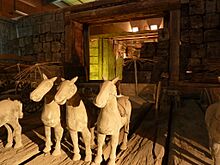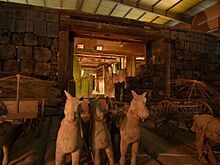Rebellion of the Seven States facts for kids
Quick facts for kids Rebellion of the Seven States |
|||||||
|---|---|---|---|---|---|---|---|
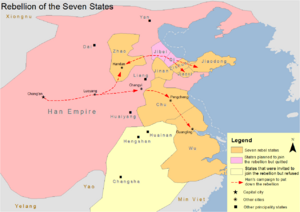 Map showing the Rebellion of Seven States during the Han dynasty |
|||||||
|
|||||||
| Belligerents | |||||||
| Han dynasty | Seven States
|
||||||
| Commanders and leaders | |||||||
|
Liu Pi | ||||||
| Strength | |||||||
| 360,000 troops |
|
||||||
| Casualties and losses | |||||||
| Unknown | All troops either deserted, or were captured or killed | ||||||
The Rebellion of the Seven States was a major conflict in 154 BC. It happened when seven powerful local rulers, called 'kings' or 'princes,' rebelled against Emperor Jing of Han. They were part of the Han dynasty in ancient China. These kings wanted to keep their own power. They did not want the emperor to make the central government stronger.
Contents
Why the Rebellion Started
At the beginning of the Han dynasty, the first emperor, Emperor Gaozu of Han (Liu Bang), gave large areas of land to his relatives. These relatives became 'princes' or 'kings' of these lands. This was done to help the Liu family stay in charge of China. These areas made up about one-third to one-half of the entire empire. The rest of the empire was ruled directly by the capital city.
Over time, these princes became very powerful. They made their own laws and even printed their own money. They also collected their own taxes. Many of them started to ignore the central government's rules. When Emperor Jing of Han became emperor in 157 BC, one area called the Principality of Wu was especially strong and acted like its own country.
A Family Feud and a Big Idea
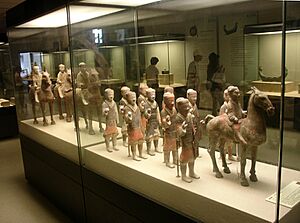
Emperor Jing had a bad relationship with his cousin, Liu Pi, Prince of Wu. Wu was a very rich area. It had lots of copper and salt.
Years before the rebellion, when Emperor Jing was still a prince, Liu Pi's son, Liu Xian, visited the capital. The two young men played a board game called liubo. During an argument, Prince Qi (who would become Emperor Jing) hit Liu Xian with the game board. Liu Xian died from the injury. Liu Pi never forgave Emperor Jing for his son's death.
Emperor Jing's main advisor, Chao Cuo, had a bold idea. He suggested that the emperor should take back some land from the princes. He said the princes had broken rules that were ignored before. Chao Cuo knew that this might make the princes rebel. But he believed it was better for them to rebel sooner rather than later. He thought they would be less prepared now.
In 154 BC, Emperor Jing followed Chao Cuo's advice. He ordered parts of several principalities to be taken back by the central government. For example, he took land from the Principality of Chu and the Principality of Zhao. He also took land from Jiaoxi because its prince had misused money. Most importantly, he took land from the powerful Principality of Wu.
The Rebellion Begins
Because of these actions, Liu Pi, the Prince of Wu, started a rebellion. Seven princes actively joined him:
- Liu Pi of Wu
- Liu Wu of Chu
- Liu Ang of Jiaoxi
- Liu Xiongqu of Jiaodong
- Liu Xian of Zichuan
- Liu Piguang of Jinan
- Liu Sui of Zhao
Two other principalities, Qi and Jibei, first agreed to join. But they did not actually send troops. The Prince of Qi changed his mind. The Prince of Jibei was stopped by his own guards. Three other princes refused to join the rebellion.
The rebel princes also asked for help from kingdoms in the south and the powerful Xiongnu people in the north. Some southern kingdoms sent troops. But the Xiongnu, after promising help, did not join the fight.
The seven princes claimed that Chao Cuo wanted to destroy all the principalities. They said they would stop fighting if Chao Cuo was executed.
Fighting the Rebels
The four principalities near Qi wanted to conquer Qi and divide its land. The Zhao forces moved west but waited for the main rebel army from Wu and Chu.
Liu Pi, the Prince of Wu, had different ideas for how to fight. One idea was to send two armies. One would attack Liang, and the other would make a surprise attack on the capital, Chang'an. Another idea was to ignore smaller cities and go straight for Luoyang to get food and weapons.
Liu Pi chose a different plan. He decided to focus all forces on attacking Liang first. He was worried that sending a large army with another general might lead to that general rebelling. He also thought the plan to attack the capital directly was too risky. So, the Wu and Chu armies attacked Liang. Liang was ruled by Emperor Jing's younger brother, Liu Wu, the prince of Liang. Liang's forces suffered heavy losses at first. Prince Liu Wu had to retreat to his capital city, Suiyang. The Wu and Chu armies then surrounded Suiyang.
Emperor Jing's Plan
Emperor Jing chose Zhou Yafu to lead his main army against the Wu and Chu forces. He also sent other generals to fight Zhao and to help Qi. Dou Ying was put in charge of coordinating these forces.
The Main Battle
The Wu and Chu armies continued to attack Suiyang fiercely. Zhou Yafu told Emperor Jing that it was better not to fight Wu and Chu head-on. He knew that Chu soldiers were very fierce and moved quickly. Instead, Zhou's plan was to let Liang defend itself. Meanwhile, his army would go around Liang and cut off the Wu and Chu supply lines. This would starve the rebel forces. Emperor Jing agreed.
Zhou Yafu set out from the capital. The Wu and Chu armies tried to assassinate him on the way. But Zhou was warned and took a different path, avoiding the attack.
After taking command, Zhou moved to cut off the rebel supply routes. Liang was in great danger, and Prince Liu Wu kept sending messages asking Zhou for help. But Zhou ignored him. Emperor Jing, worried about his brother, ordered Zhou to go help Liang immediately. Zhou refused. Instead, he sent cavalry to cut off the Wu and Chu supply lines.
This plan worked. Wu and Chu could not capture Liang quickly. Liang's generals, Han Anguo and Zhang Yu, defended the city well. The rebel armies then turned to attack Zhou. But Zhou refused to fight them directly. He focused on defending his camp. After failing to defeat Zhou, the Wu and Chu armies began to run out of food. Their forces fell apart. Liu Pi fled to Donghai, but Donghai killed him and made peace with the Han dynasty. Liu Wu, the prince of Chu, took his own life.
Other Fights
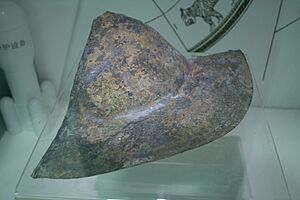
Another small part of the rebellion involved a man named Zhou Qiu. He went to his hometown, Xiapi. Pretending to be an imperial messenger, he took over the local militia. He convinced the people to join the rebellion. They won some battles against forces from the Principality of Chengyang. But when Zhou Qiu heard that Liu Pi had been defeated, he became so worried that he died.
Meanwhile, four rebel principalities were surrounding the Qi capital, Linzi. The Prince of Qi, Liu Jianglü, thought about giving up. But his messenger, Lu, who had been captured by the rebels, told him to keep fighting. Lu shouted this from outside the city walls, even though the rebels threatened him. Eventually, the Han generals Luan Bu and Cao Qi arrived. They defeated the four principalities. However, they also found out that Qi had originally planned to join the rebellion. Unable to explain himself, Prince Jianglü took his own life. But Emperor Jing felt sorry for him and let his son inherit the principality.
The princes of the four defeated principalities were not so lucky. One general, Han Tuidang, wrote to Liu Ang, the Prince of Jiaoxi. He threatened total destruction if Prince Ang did not surrender. Prince Ang surrendered and was allowed to take his own life. The other three princes were captured and executed. Their lands were taken by the central government.
The last principality to be defeated was Zhao. The Han general Li Ji struggled to capture the Zhao capital, Handan. Zhao's hopes were lost when the Xiongnu, seeing Zhao was about to lose, decided not to join the battle. When Luan Bu returned from Qi, he attacked Handan with Li. They captured the city by breaking a dam and flooding its walls. Liu Sui, the Prince of Zhao, took his own life.
Liu Zhi, the Prince of Jibei, who had wanted to join the rebellion, was spared. An official convinced Liu Wu, the prince of Liang, that Liu Zhi had only pretended to join the rebels. He said Liu Zhi had actually helped defeat them. With Prince Liu Wu's help, Prince Zhi was saved. He was given a different principality instead.
This fierce rebellion lasted only three months before it was defeated.
What Happened Next
The first Han emperor, Liu Bang, had given power to his relatives to protect the dynasty. But by Emperor Jing's time, these powerful princes were causing problems. They refused to follow the central government's laws. If the seven princes had won this rebellion, the Han dynasty might have broken into many separate states.
After the rebellion, the system of principalities continued. But the power of the princes was slowly reduced. Their lands were also made smaller. This happened under Emperor Jing and his son, Emperor Wu of Han. Because the Han dynasty lasted for a very long time, the idea that China should be a unified empire, not divided states, became a strong belief.
See also
- Zhuang Ji
 | William L. Dawson |
 | W. E. B. Du Bois |
 | Harry Belafonte |


